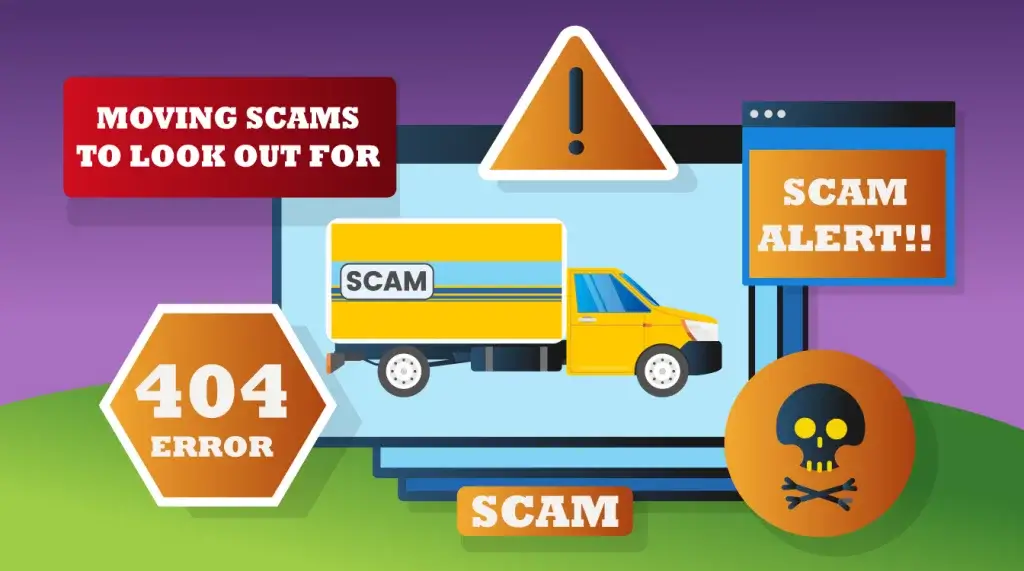Moving can be an exciting and enlightening experience, especially if you are relocating to a new city or state. While it’s natural to be concerned about the logistics of packing your belongings and transporting them to your new home, it’s critical to be aware of the possibility of moving scams. Unfortunately, scammers may try to take advantage of your stress and vulnerability during this time to defraud you.
Moving scams can take many forms, including unlicensed or uninsured movers, fraudulent moving companies, or rogue movers who may hold your belongings hostage until you pay an exorbitant fee. These scams can cost you hundreds or even thousands of dollars, and in some cases, you may never see your belongings again.
That is why it is critical to be aware of the possibility of moving scams and take precautions to protect yourself. You can ensure a stress-free move by conducting thorough research and remaining vigilant. In this blog post, we’ll go over the different types of moving scams to look out for, red flags to look out for, and steps you can take to avoid becoming a victim of a moving scam.
Table of Contents
ToggleTypes of moving scams
There are several types of moving scams that people should be aware of when hiring a moving company. Here are a few examples:
- Unlicensed movers: These are moving companies that do not have a proper license. Most states require movers to be licensed by the Department of Transportation (DOT). Unlicensed movers may offer low prices to attract customers, but they may not be held to the same standards as licensed movers and may not be insured. This means that if something goes wrong during the move, you may be out of luck.
- Uninsured movers: Like unlicensed movers, uninsured movers may offer low prices to attract customers, but they may lack proper insurance coverage. This means that if any of your belongings are lost, damaged, or stolen during the move, you may not be compensated.
Moving company fraud: This type of scam involves fraudulent moving companies that may not exist or may not be able to move your belongings. These companies may request a large deposit up front and then disappear with your money. - Rogue movers: Rogue movers are unlicensed or uninsured movers who may hold your belongings hostage until you pay an exorbitant fee. They may also try to charge you for damages they caused, or they may add hidden fees to your bill.
It is critical to be aware of these types of moving scams and to conduct thorough research before hiring a moving company. You can protect yourself and your belongings during the moving process by using a licensed and insured mover.
Red Flags to Look Out For
When looking for a moving company, it’s critical to be aware of any red flags that could indicate a scam. Here are a few red flags to look out for:
- Unprofessional or ambiguous website: A legitimate moving company should have a professional website that clearly lists their services and pricing. If the website is poorly designed or does not provide much information, this could be a red flag.
- Lack of a physical address: A moving company should have a physical address where you can contact them. If a company only provides a PO Box or a phone number, this could indicate that they are not a legitimate business.
- Lack of licensing or insurance: As previously stated, most states require movers to be licensed by the Department of Transportation (DOT). It is critical to confirm that the company you are considering is licensed and insured.
- Requiring a large deposit upfront: Some moving companies may require a deposit upfront, but be wary of companies that require a large deposit before any work is done. This could indicate that the company is not legitimate.
- Offering extremely low prices: While it’s natural to want to save money on your move, be wary of moving companies that offer extremely low prices in comparison to their competitors. This could indicate that they are cutting corners or are not properly insured.
By being aware of these red flags, you can avoid becoming a victim of a moving scam.
How to Avoid Moving Scams
To avoid moving scams, do your research and be proactive in selecting a reputable moving company. Here are a few steps you can take to avoid moving scams:
- Investigate various moving companies: Don’t settle for the first company you come across. Take the time to research multiple companies and compare their services and pricing.
- Examine the company’s licensing and insurance: As previously stated, most states require moving companies to be licensed by the Department of Transportation (DOT). It is critical to confirm that the company you are considering is licensed and insured.
- Read reviews and obtain references: Look for reviews and testimonials from previous customers to get a sense of the company’s reputation. You can also request references from the company and contact them to inquire about their experiences.
- Obtain a written estimate: A reputable moving company should provide you with a written estimate outlining the services they will provide as well as the total cost of the move. Be wary of companies that refuse to provide a written estimate or try to change the price after the move has been completed.
Inquire about the company’s policies on damages and delays: Moving can be unpredictable, so it’s important to know what the company’s policies are in the event of damages or delays. Inquire about their policies for dealing with damages and what they will do in the event of a delay.
By following these steps, you can protect yourself from moving scams and ensure a smooth and stress-free move.
What to Do If You’ve Been a Victim of a Moving Scam
If you have been a victim of a moving scam, you must act quickly to try to resolve the situation. Here are some steps you can take:
- Contacting the police and filing a report: If you believe you have been the victim of a moving scam, you must notify the authorities. Contact the police and file a report with all relevant details, including the name of the moving company, any contact information you have, and any documentation related to the move.
- Notifying the Federal Motor Carrier Safety Administration (FMCSA): The FMCSA is a federal agency that regulates the moving industry and investigates complaints. You can file a complaint with the FMCSA by visiting their website or calling their hotline.
- Seeking legal counsel: If you have suffered significant losses as a result of a moving scam, you should consider seeking legal counsel. A lawyer can help you understand your options and take action to recover your losses.
If you are the victim of a moving scam, you must act quickly. By taking these steps, you may be able to resolve the problem and protect yourself from further harm.
Conclusion
To summarize, it is critical to be aware of the possibility of moving scams and to take precautions to protect yourself. Moving scams include unlicensed or uninsured movers, fraudulent moving companies, and rogue movers. To avoid becoming a victim of a moving scam, do your homework, check the company’s licensing and insurance, read reviews and get references, get a written estimate, and inquire about the company’s policies on damages and delays.
If you are a victim of a moving scam, you should take immediate action to try to resolve the situation, such as contacting the police, reporting the scam to the Federal Motor Carrier Safety Administration, and seeking legal assistance if necessary.
You can ensure a stress-free move by following these steps and being cautious when selecting a moving company. Don’t let moving scams ruin your relocation experience; instead, do your research and make an informed decision to protect yourself and your belongings.




